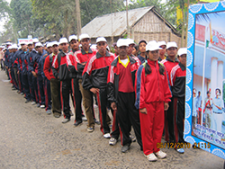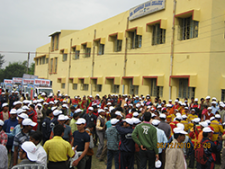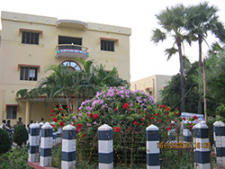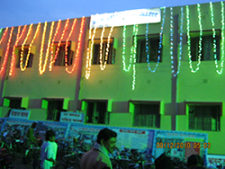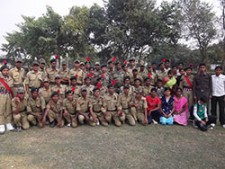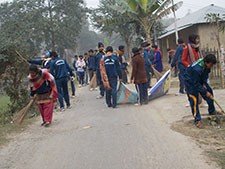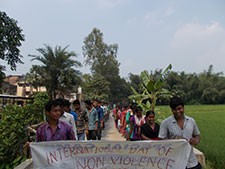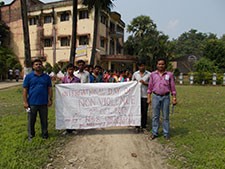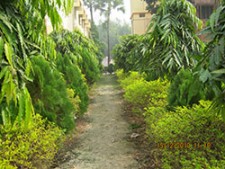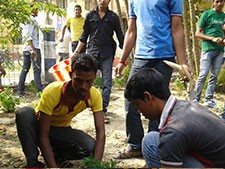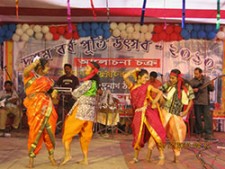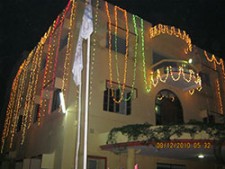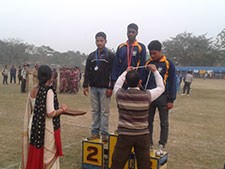Sanskrit
- Introduction
- Curriculum
- Teaching & Learning
- Learning Resources
- E-Learning initiatives
- Seminar, Conferences, Webinar and Workshops
- Notices & Events
- Contact Information
History of the Department
The Department of Sanskrit started its journey in 2009 by introducing General course. It obtained the approval for introducing Honours course in Sanskrit in 2009. Besides students’ interest in opting for Honours courses in English and Geography, there has been a huge demand amongst students for choosing Sanskrit as Honours subject. At present, there are 67 sanctioned seats for three-year Honours courses. The faculty of the department consists of two full time teachers and three SACTs (State Aided College Teacher). Many students have graduated from the Department of Sanskrit as Honours and General candidates and placed themselves in higher studies. Moreover, many students of the department have established themselves in various sectors, especially as accomplished teachers in various H.S. schools and degree colleges. They have been in touch with the department as alumni. Besides teaching, the department regularly organizes various co-curricular activities like seminars, debates, and group discussions. These activities help the students to prepare for the higher studies as well as for their future placement in the competitive job markets. The students are also encouraged to nurture their creativities through the departmental Wall Magazine and teachers guide them properly in this regard. Above all, the faculty members are always ready to render all possible assistance and guidance to students inside and outside the campus as and when required.
Vision
- To impart quality Sanskrit to rural and economically weaker students.
- To create interest to opt for Sanskrit as a major subject in higher education.
- To raise the standard of our students to global levels and make them employable.
- To provide a platform to the students to exhibits their talents and creativity.
- To train and counsel students to become more employable.
Mission
- To provide Sanskrit not only to acquire knowledge but also to inculcate a sound philosophy for a holistic living.
- To encourage self-evaluation, personality development and guide the students to strive towards perfection and competence.
- Department of Sanskrit provides excellent teaching and learning environment with its focus on continuing education.
- More scope to use modern Sanskrit literature with ethical study in teaching learning programs.
Honours Program
Objective of the honours program
- Introduce the student to idea of महाकाव यम्according to रधुवंशम् and किरातार्जुनीयम्।
- Introduce the student to idea of “Survey of Epic Poetry” .
- To make the students familiar with the most ancient literature of the world.
- To enable the students to understand the Sanskrit Grammar.
- To make the students be familiar with the importance features of Sanskrit Drama.
Syllabus for the Honours Program
CLICK HERE FOR HONOURS- GENERAL PAPER
Course outcome
Programme Specific Outcomes
Sanskrit is the pathway which connects the dimmed past of ancient India to the present digital India of 2017. In fact, historically, Indian society and culture are unique and this contextually specificity of Indian social realities could be grasped through Sanskrit texts.
The academic programme, both Honours and General courses enable the students not only to acquire the following professional skills but also develop a deep understanding of rich heritage and dynamic prevalent scenario of India through various texts in different disciplines of ancient pedagogy, composed in Sanskrit.
Reading: Students will become accomplished active readers who appreciate ambiguity and complexity, and who can articulate their own interpretations with an awareness and curiosity for other perspectives.
Writings: Students will be able to write Devnagari Scripts.
Culture and History: Students will gain knowledge of the major traditions of literatures written in Sanskrit.
Research Skills: Students will be able to identify topics and formulate questions for productive inquiry.
Oral Communications: Students will demonstrate the skills needed to participate in conversation that builds knowledge collaboratively.
Sanskrit as a Career Option: Sanskrit is recognized as “mother of all languages” throughout the greater portion of the world. Even if you aiming for a bright career only, Sanskrit can provide it, till today. Harvard of Cambridge oxford to Trinity college Dublin – can end up with a faculty post in some highly ranked universities.
Mode of Hindu Survival: Sanskrit and only Sanskrit is the language which should bubbles up in our mind even if we merely think about Hindu Survival.
Practical Advantages: It someone does not know Sanskrit he is obviously missing something. He cannot get the clear perspective of Vedas, Geeta, Upanishads, Ramayana, Rāmāyaṇa, Mahābhārata,Purāṇas and many the books, which are still regarded as the finest piece by a large portion of our society.
One step Towards Spiritual upliftment: We need to keep in mind that it has a perfect grammar and nicely built structure.
Chapter-Specific Course Outcomes:
SEMESTER – I
101- SANH- C-1
Classical Sanskrit Literature (Poetry)
Unit : I. Raghuvaṁśa canto – I
Unit : II. Kirātārjunīya Canto – I
- To enhance the basic understanding of the language and literature thought.
- Knowledge of Kalidas’s & Bharavi’s with a brief note on the epic-poem Raghuvaṁśam canto – I &Kirātārjunīyam Canto – I.
- Identify and describe distinct characteristics of literary texts.
- Analyse literary works for their structure and meaning.
- Effectively communicate ideas related to the literary works during class and group activities.
- Identify and describe distinct literary characteristics of poetic forms.
- Analyse poetic works for their structure and meaning, using correct terminology.
- Effectively communicate ideas related to the poetic works during class and group activities.
102- SANH- C-2
Critical Survey of Sanskrit Literature & Prosody (Section: A)
Unit-I Survey of EpicPoetry: Rāmāyaṇa, Mahābhārata &Purāṇas
Unit-II Classical Mah ākāvyas:Aśvaghoṣa, Kālidāsa, Bhāravi, Māgha,Śrīharṣa
Unit-III Critical survey of Sanskrit Drama (Bhāsa, Kālidāsa, Śūdraka, Viśākhadaṭṭa, Rājśekhara,Harṣavardhana(Upto10A.D.)
- Basic introduction to Sanskrit literature through epic poem, Rāmāyaṇa, Mahābhārata &Purāṇas.
- Display a working knowledge of the genres of classical Mahākāvyas, Epic poetry, and drama by writers from various cultures and historical eras.
- To equip the student with the know-how of highest aspects of Sanskrit literary composition representing the poetry & Dramaturgical piece of literature.
- The course intends to expose the students to the two most celebrated epics, the Mahabharata and Ramayana, as the source texts of the subsequent literary works representing the Indian value systems, socio-cultural conditions and philosophical expressions.
SEMESTER – II
201-SANH-C-3
Classical Sanskrit Literature (Prose)
UNIT : I Śukanāsopadeśa
UNIT :II R ājavāhanacarita
Unit:III Origin and development of Prose: Prose Romances andFables
- Knowledge of introduction to the treatise of Śukanāsopadeśa,Rājavāhanacarita, Prose Romance and Fables.
- Display a working knowledge of the prose as a literary genre.
- The course intends to acquaint the students with ethical and moral values though some selected stories tales and fables.
- Identify and describe distinct literary characteristics of the prose.
- Reading Sanskrit Prose and story they can gain various moral values.
202-SANH-C-4
General Sanskrit Grammar and itsapplication
Unit-1 SvaraSandhi, kṛt Pratyaya, Taddhita Pratyaya (Apatya, Matvarthīya only and Strī Pratyaya) Ātmanepadabidhān, Parasmaipadabidhān, Sananta, Yaňanta, Nāmadhātu.and selectedtechnicalterms
Unit: II Application. a) Translationfrom Mother Language / English to Sanskrit. b) Translation from Sanskrit to Vernacular /English.
- Students will be able to understand the general Sanskrit Grammar and its application.
The basic rules of Grammar viz. Svara Sandhi, kritprataya, atmanepadabidhana, parasmayapadabidhan, pada, prātipadika, pratyāhāra, vṛddhi,guṇa,saṁprasāraṇa,i,upadhā,āmreḍita, pragṛhya, nipāta, saṁyoga, saṁhitā, nadī,ghi,avyaya,vibhāṣa, itsavarṇa,sarvanāmasthāna etc. will enable the students to construct and to understand the basics of Sanskrit language.
- Learning the Sanskrit Grammar, they clearly communicate in Sanskrit.
- Learning the proper grammar, they express their thoughts and ideas.
- They can write and speak correctly.
- They gain the knowledge of Sutra, Vartika, Bhasya, etc.
- The students able to know about the Sanskrit grammatical traditions.
SEMESTER – III
301-SANH- C-5
Classical Sanskrit Literature (Dramas)
Unit : I Svapnavāsavadatta
Unit: II Abhijñānaśākuntala
- To equip the student with the know-how of highest aspects of Sanskrit literary composition representing the poetry & Dramaturgical piece of literature.
- Display a working knowledge of the genres of drama by writers from various cultures and historical eras.
302-SANH- C-6
Śatakakāvya & Modern Sanskrit Literature
Unit : 1 Nītiśatakam (First Two Paddhatis) (Verse 1-20)
Unit-II: Survey of Modern Sanskrit Literature(Special Reference to Bengal) (Haridāsasiddhāntavāgīśa, Kālipada Tarkāchārya,Siddheswar Chattopādhyāy, Śrījīvanyāyatīrtha, Vīrendrakumar Bhattāchārya, Ramā Chaudhury, Dipak Ghosh & Sītānāth Āchārya)
Unit-III Mevārapratāpa of Haridāsasiddhāntavāgīśa (Canto-I),Gadādharavivāhakathā of Tārāpada Bhattāchārya
- Knowledge of ethic introduction to the treatise of Nitishastra.
- Śatakakāvya& Modern Sanskrit Literature gives various values and humanity in our society.
- Nītiśatakam have so many moral values for our students and society.
- Reading the modern Sanskrit literature students mind revived its old interesting thirst.
- Marked by a strong and intentional break with tradition. This break includes a strong reaction against established religious political and social views.
303-SANH- C-7
Indian Social Institutions & Polity
Unit : I Manusaṁhitā Chap – VII
Unit : II Arthaśāstra – Vidyāsamuddeśa
Unit : III History of Dharmaśāstra, Arthaśāstra & Nītiśāstra
-
-
- The subject matter of Arthashastra students also gives the political, economical, cultural, social, religious and administrative system knowledge of Kautilya.
- Students can learn that king created from eternal particles of main demigods.
- Understand the ancient India legal system, political & religious institutions through the Manu smriti.
- They can learn relationship to brahmanas, results of money given to brahmanas.
- Students also learn taxes maintain and protect brahmanas; brahmanas activities increase king’s life.
- They learn war strategy, pleasure and duty.
- They can learn how British were successful in overpowered India, after Mughals were weakened.
- One must also know how Indian education system Gurukul System was overtaken by convert school culture under a well drafted plan to produce Indians who thinks and behave like Englishman.
-
SEMESTER – IV
401- SANH-C-8
Self-Management in theGītā &Īsopaniṣad
Unit: I Self-Management in theGītā Chapter: III Karmayoga (1-20) , Chapter: IV Jñānayoga (Verse 1-20) ChapterXIV Guṇatrayavibhāgayoga (1-27) Chapter:XII Bhaktiyoga (1-20)
Unit:II Īsopaniṣad with Śaṁkarabhāṣya (Marks-25)
-
- This leaching is considered to be ultimate It encompasses each and every aspect of life. One surely can lead a peaceful life if the teachings of Gita are followed.
- The primary purpose of Gita is to illuminate for all of humanity the realization of the true nature of divinity.
- The Gita talks a lot about meditation and its importance.
- Students can develop their personality of godhead is the ultimate support of any human being.
- They learn that what they have as everything would be left over here in this material world; we won’t be able to take anything with us.
- The students will be exposed to Bhagavad-Gita’s &Īsopaniṣad concepts of the divine and demoniac nature.
- The Īsopaniṣadtalks a lot about meditation and its importance.
402- SANH-C-9
Ancient Indian Judiciary System & General introduction to Scientific and Technical Literature
Unit: I Yājñyavalkyasaṁhitā (Vyāvahārādhyāya)
Unit: II General introduction to Scientific and Technical Literature
-
- The subject matter of Yājñyavalkyasaṁhitā students also gives the cultural, social, religious system knowledge of Yājñyavalkya.
- This course offers generalintroduction to Scientific and Technical Literature.
- This course offers ancient Indian judiciary system andgeneral introduction to scientific and technical literature
403- SANH-C-10
Poetics,History of Sanskrit Poetics & Sanskrit in World Literature
Unit: I Kāvyālaṁkārasūtravṛtti (Adhikaraṇa-1)
Unit: II History of Sanskrit Poetics
Unit: IIISanskrit Studies Across the World William Jones, Charles Wilkins, H.Wilson, Max Müller, J.G.Bühler, Pañcānana Tarkaratna, Aurobindo, Kṣitish Chandra Chatterjee, Ramā Chaudhuri & Ramāranjan Mukherjee)
-
- Students can apply as a term to any argumentation about literature, whether or not specific works are analysed.
- They learn many notable works of criticism combine discussions of texts with broad arguments about the nature of literature and the principles of assessing it.
- Criticism will help the students to cover all phases of literary understanding.
- Students can evaluate and interpret of a topic.
- Students get knowledge about the foreign researchers and writers.
SEMESTER – V
501- SANH- C-11
Vedic Studies: Hymns, Upanisad & History of Vedic Literature
Unit-I: Vedic Selection (Marks-20 ) Agni (1.1), Indra (2.12), Devī, Akṣa(10.34),Bhūmi(12.1-12):Saṁhitā toPadapātha
Unit-II : Bṛhadāraṇyaka Upaniṣad (2.4) (Marks-15)
Unit-III: History of Vedic Literature (Upto Vedāṅga) (Marks-15)
-
- The course proved in depths study of the Rigvedic Hymns depicting several Deities thus expressing the ancient Indians religious believes system.
- Students can learn Vedic agriculture in Ancient India.
- They can analyse between women’s education in ancient India and modern education system.
- They came to know Vedic society, Vedic age society, Vedic culture and tradition.
- Origin of caste system in India.
- To expose the students with various form of the Vedic Wisdom, belief system spirituals expressions and social aspiration.
- Students come to know how this Vedic literature speaks about historical and geographical references.
- Students will get knowledge of ancient Indian epistemology and ontology.
502- SANH- C-12
Sanskrit Dramaturgy & Rhetorics
Unit–I Sāhityadarpaṇa (Chapter– VI)
Unit–II Sāhityadarpaṇa (Chapter– X)
-
- Students come to know about the Sandhi, Arthaprakṛti, Nāndī, Arthapakṣepaka, Patākāsthāna, Prastāvanā, vṛtti, Rupaka, Kārya,avasthā etc.
- Students will get knowledge about various type of alankars like Arthāntaranyāsa, Arativastupama, Ullekha, Pariṇāma, Ananvyaya, Ekāvali, Anuprāsa,Yamaka, Śleṣa, Upamā, Rūpaka, Sandeha , Bharāntimān, Apahnuti, Utprekṣā, Atiśayokti, Tulyayogitā, Dīpaka, Dṛṣṭānta, Nidarśanā, Vyatireka, Samāsokti, Svabhāvokti, Aprastutaprasaṁsā, Kāvyalinga, Vibhāvanā and Viśeṣokti etc.
503- SANH- DSE- 1A
Sanskrit Grammar and Linguistics
Unit –I Siddhāntakaumudī (Kāraka)
Unit-II Linguistics Language: its nature, development and origin,
classification of languages, elements of the science oflanguage, phonetic laws & tendencies Indo-Europian Family of Languages
-
- The basic rules of Grammar viz. Kāraka, will enable the students to construct and to understand the basics of Sanskrit language.
- Learning the Sanskrit Grammar, they clearly communicate in Sanskrit.
- Learning the proper grammar, they express their thoughts and ideas.
- They can write and speak correctly.
- They gain the knowledge of Sutra, Vartika, Bhasya, Karaka etc.
- The students able to know about the Sanskrit grammatical traditions.
- Comparison of different languages.
- Understand that language in an historical context.
- They can learn what the culture finds important or unimportant, its history, its expectations, its fears and its hopes.
- It gives a deeper understanding of the language through its history, development etc.
OR
503- SANH- DSE- 1B
Indian Epigraphy and Chronology
Unit-I Epigraphy: The History of Epigraphical study in India.
Unit-II Inscriptions:Asokan rock iscription – I Junagadh inscription of Rudradamana, Allahabad Pillar inscription of Samudragupta, Hatigumpha inscription of kharavela
-
-
- The students get knowledge about Indian Epigraphy and chronology earliest traces of epigraphy in the Indian Subcontinent are found in the undeciphered inscriptions of the Indus Valley Civilization (Indus script), of Asokan rock iscription – I Junagadh inscription of Rudradamana, Allahabad Pillar inscription of Samudragupta, Hatigumpha inscription of kharavela.
-
504- SANH- DSE- 2A
Ontology & MetaphysicsTarkasaṁgraha:
Indian Ontology and Metaphysics:
-
-
- A conceptual perspective that human behaviours and actions are largely determined by stimuli which are not of their own making.
- The relevance of the emergence of debate for philosophical activity in India.
- The significance of epistemology in Indian philosophy and the sense in which religion is involved in it.
- An attempt to extract some intercultural aspects of the history of Indian Philosophy.
-
OR
503- SANH- DSE- 2B
Tarkasaṁgraha
-
-
- The definitions and concepts are totally based on Tarkasaṁgraha.
- basic understanding of invariable concomitance (vyāpti) & its types
- Inference (anumāna) & its key terms.
- The significance of epistemology in Indian philosophy and the sense in which religion is involved in it.
- demonstration of pervasion – upādhi and tarka, nature and variety of tarka.
-
505- SNSK- SEC-1
Communicative Sanskrit & Computer Application
Unit-I Communicative Sanskrit
Unit-II Computer Typing: Devanāgarī Script and Roman script with diacritical
Unit-III Proof Reading(from the I &II actofAbhijñānaśākuntala)
-
-
- Learning the Sanskrit Grammar, they clearly communicate in Sanskrit.
- Learning the proper grammar, they express their thoughts and ideas.
- They can write and speak correctly.
- They gain the knowledge of Computer and Computer Sanskrit typing etc.
- The students able to know about the Proof-Reading of Sanskrit grammatical traditions.
-
SEMESTER – VI
601-SANH-C-13
Saptapadārthī & Generalacquaintance with the main system of Indian Philosophy
Unit: II General acquaintance with the main system of Indian philosophy
-
-
- The relevance of the emergence of debate for philosophical activity in India.
- The significance of epistemology in Indian philosophy and the sense in which religion is involved in it.
- An attempt to extract some intercultural aspects of the history of Indian Philosophy.
-
602-SANH-C-14
Sanskrit Grammar & Āyurveda
Unit:I Siddhāntakaumudī (samāsa)
Unit:II Carakasaṁhitā : 1
-
-
- Students will be able to understand the general Vedic Grammar and its application.
- The basic rules of Vedic Grammar viz. samāsa will enable the students to construct and to understand the basics of Sanskrit language.
- Learning the proper Sanskrit grammar, they express their thoughts and ideas.
- The students able to know about the Vedic grammatical traditions.
-
603- SANH -DSE-3A
Vedic Studies & Vedic Grammar
Unit: I Saṁhitā,Brāhmaṇa&Upanisad Ṛgveda –Uṣas (3.61), Hiraṇyagarva (10.121),Vāk (10.125) Yajurveda : Śivasaṁkalpa (34.1-6) Satapatha Brāhmaṇa – ManumatsyakathāTaittiriya Upaniṣad (2.4)
Unit:II Declension, Conjugation Subjunctive, Infinitive, Compound, Accent, Upasarga, Aorist, Sandhi.
-
-
- Students will be able to understand the general Vedic Grammar and its application.
- The basic rules of Vedic Grammar viz. Declensions, Conjugation, Subjunctive, Infinitive Compound, Accent, Upasarga, Aorist, Sandhi, Iti, Avagraha etc. will enable the students to construct and to understand the basics of Sanskrit language.
- Learning the proper Vedic grammar, they express their thoughts and ideas.
- The students able to know about the Vedic grammatical traditions.
-
OR
603- SANH -DSE-3B
Vedic Studies & Vedic Grammar
Unit: I Saṁhitā, Brāhmaṇa Ṛgveda – Viṣṇu(1.154), Saraswati(6.61), Vāk (10.125) Yajurveda : Śivasaṁkalpa(34.1-6) Aitareya Brāhmaṇa – Chapter 1
Unit:II Aitareya Upaniṣad
Unit:III Vedic Grammar Declensions, Conjugation, Subjunctive, Infinitive Compound, Accent, Upasarga, Aorist, Sandhi, Iti, Avagraha.
-
-
- Students will be able to understand the general Vedic Grammar and its application.
- The basic rules of Vedic Grammar viz. Declensions, Conjugation, Subjunctive, Infinitive Compound, Accent, Upasarga, Aorist, Sandhi, Iti, Avagraha etc. will enable the students to construct and to understand the basics of Sanskrit language.
- Learning the proper Vedic grammar, they express their thoughts and ideas.
- The students able to know about the Vedic grammatical traditions.
-
604- SANH -DSE-4A
Sanskrit Literature & Literary Criticism
Unit: I Bhaṭṭikāvya(Canto-II)
Unit:II Kāvyādarśa (Chapter-I)
-
-
- Students can apply as a term to any argumentation about literature, whether or not specific works are analysed.
- They learn many notable works of criticism combine discussions of texts with broad arguments about the nature of literature and the principles of assessing it.
- Criticism will help the students to cover all phases of literary understanding.
- Students can evaluate and interpret of a topic.
-
OR
604- SANH -DSE-4B
Sanskrit Literature & Literary Criticism
Unit: I Bhaṭṭikāvya(Canto-II)
Unit:II: Sāhityadarpaṇa (chapter-I)
-
-
- Students can apply as a term to any argumentation about literature, whether or not specific works are analyzed.
- They learn many notable works of criticism combine discussions of texts with broad arguments about the nature of literature and the principles of assessing it.
- Criticism will help the students to cover all phases of literary understanding.
- Students can evaluate and interpret of a topic.
-
605- SANH – SEC-2
Writing Skill & Comprehension
Unit:I Paragraph Writing using key words (within 15 sentences)
Unit:II Letter Writing
Unit:III Seminar Paper Presentation
Unit:IV Comprehension
-
-
- The basic rules of paragraph writing using key words, will enable the students to construct and to understand the basics of Sanskrit language.
- The basic rules of letter writing, will enable the students to construct and to understand the basics of Sanskrit language for communication to each other’s.
- They can present the paper of various type of seminar paper.
- They gain the knowledge of comprehension writing in Sanskrit language.
-
Generic Elective
-
-
- Objective of Generic Elective
- The terms of Indian classical Sanskrit drama refer to the traditional of dramatic literature and performance in ancient India.
- To equip the students with the principals of Sanskrit Grammar.
- To enable them to know the origin and development of Prose Romance in Sanskrit.
- The course offers a good introduction to the Sahityadarpanah (Chapter-X); it gives us some aesthetics, prolific poet knowledge and its application.
- Core 201 Unit-I, II & III offers a good introduction to some ethical story and prose like Śukanāsopadeśa and Rājavāhanacarita; those are gives us some ethical values, moral culture and education.
-
Syllabus for the Generic Elective
iii) Course outcome
-
-
- Students will be acquainted with the poetic beauty of Sanskrit Prose works.
- Students will be able to understand the general Sanskrit Grammar and its application.
- The learners will know about the origin and development of Sanskrit Drama.
- To inculcate in students the high moral values those are being displayed by the different characters of the Sanskrit works.
- Learners will be familiar with the rich traditions of the composition Uponisad.
-
a) Faculty Profile
| DARIN SARKAR | 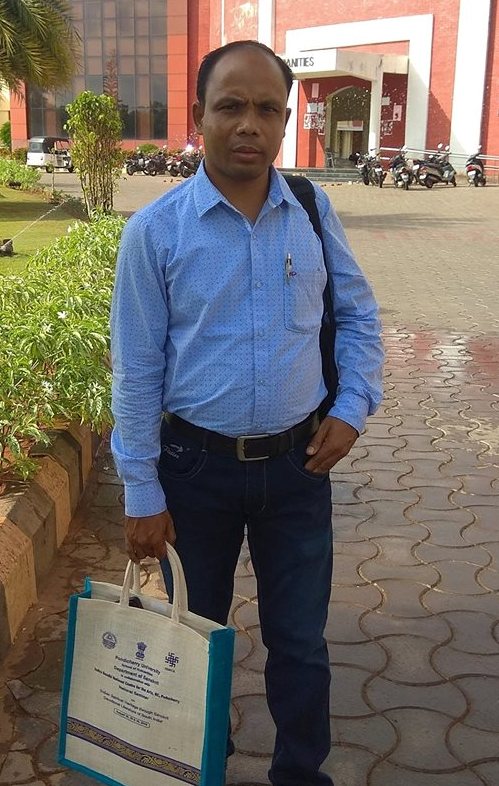 |
| ASSISTANT PROFESSOR & HOD | |
| M.A., M.PHIL | |

|
| CHANDRANI HALDER BANIK | 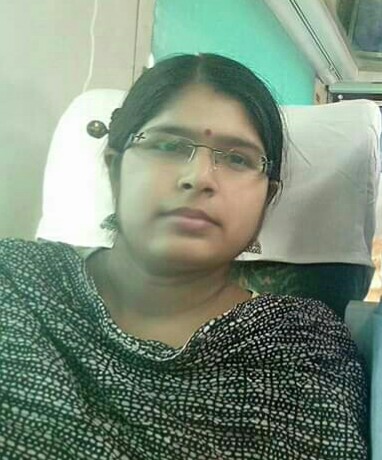 |
| ASSISTANT PROFESSOR | |
| M.A., B.Ed. | |

|
| PRATIMA BARMAN | 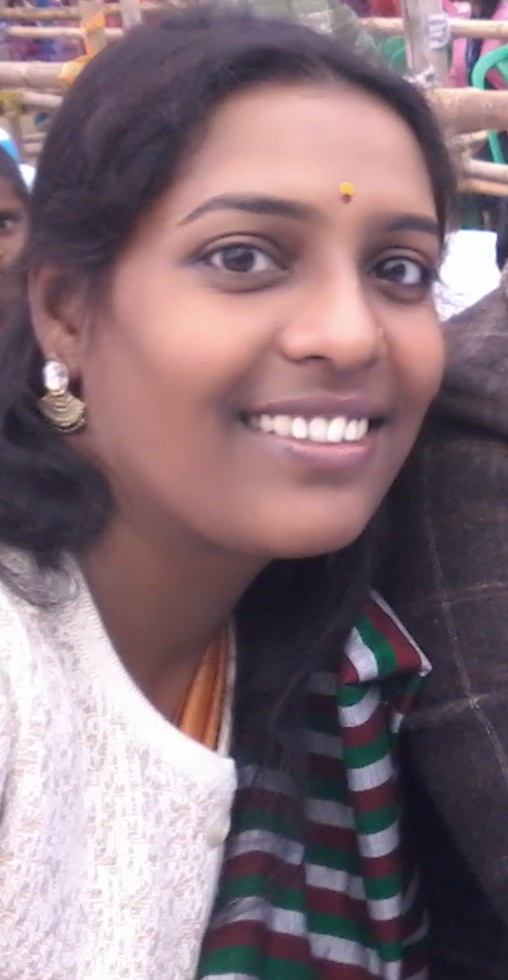 |
| SACT | |
| M.A. | |

|
| Tridip Mandal | 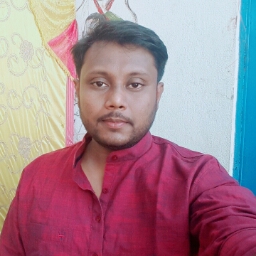 |
| SACT | |
| M.A in Sanskrit | |

|
| TAPASH CHANDRA ROY | 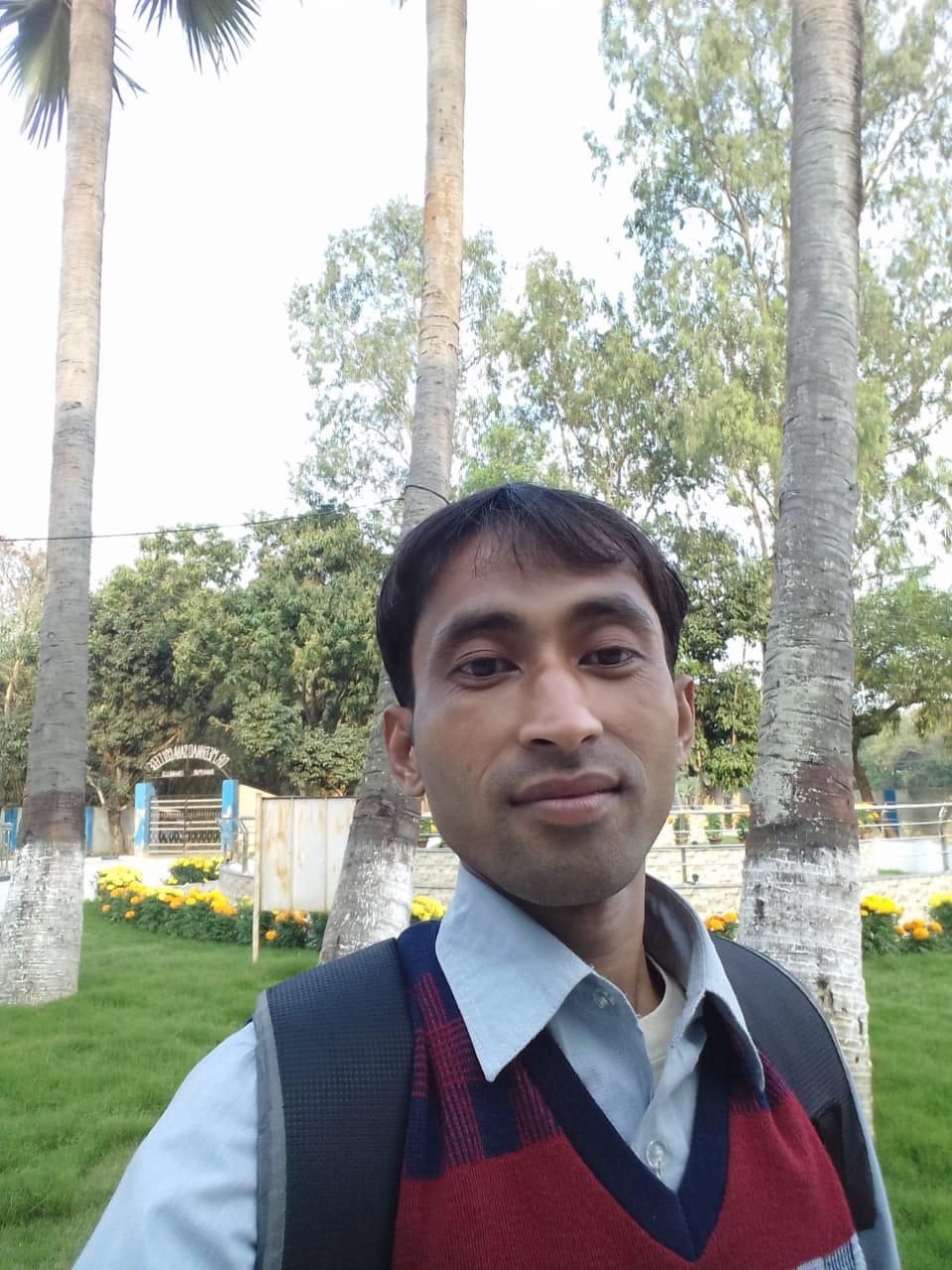 |
| SACT | |

|
b) Students Sanskrit Honours intake capacity of Current Year category wise
|
Intake |
UR |
OBC-A |
OBC-B |
SC |
ST |
PH |
TOTAL |
Gender equality |
|
|
35 |
07 |
05 |
15 |
05 |
00 |
67 |
|||
|
Enrolment in 2015-16 |
|
|
|
|
|
|
Male |
Female |
|
|
|
|
||||||||
| Enrolment in 2016-17 |
22 |
06 |
23 |
03 |
00 |
54 |
M=32 |
F=22 |
|
| Enrolment in 2017-18 |
15 |
13 |
26 |
02 |
00 |
56 |
M=32 |
F=24 |
|
| Enrolment in 2018-19 |
11 |
09 |
27 |
03 |
00 |
50 |
M=33 |
F=17 |
|
| Enrolment in 2019-20 |
12 |
06 |
29 |
00 |
00 |
47 |
M=33 |
F=14 |
|
Sanskrit general intake capacity category wise
|
UR |
OBC-A |
OBC-B |
SC |
ST |
PH |
TOTAL |
|
NA |
NA |
NA |
NA |
NA |
NA |
555 |
Enrolment and gender equality
|
Year |
Total |
Male |
Female |
|
2nd Semester Hons |
58 |
17 |
41 |
|
Part II Hons |
29 |
09 |
20 |
|
Part III Hons |
42 |
13 |
29 |
c) Teaching Methodology
-
-
- Internal assessment:
-
The department organizes regular internal assessment as per with the current CBCS syllabus and also various problem-solving classes taken for their quality enhancement.
-
-
- Group Discussion:
-
Regular Group Discussion also organized for enhancement of their ability for leadership quality, speaking ability, public speaking ability, social skills.
-
-
- Quiz:
-
For enhancement of their competitive mind and increasing problem solving skills the department organizes quiz competition regularly.
-
-
- Participatory Learning:
-
The department organizes regularly Youth Parliament Competition, and participate Inter College District Level Competition as well as Divisional level. The youth Parliament is a programme in which group discussion and role-plying techniques can effectively be used.
-
-
- Strategies for slow learners:
-
Special and extra classes are taken for the slow learner.
-
-
-
- The department has one dedicated ICT enabled classroom.
- The department has a department library and students also uses the central library facility
-
-
-
-
-
- Faculties of the department use various online platforms for direct teaching, evaluation and resource sharing.
- Study materials also regularly uploaded in the college websites by the faculties of this department.
- N-LIST is extensively used by the faculty and the students of the department.
-
-
|
Sl No. |
Event |
Date |
Name of the Resource Persons |
Number of participants |
Theme |
Outcome |
|
1. |
One Day National Webinar |
8th July 2020 |
Prof. Gopabandhu Mishra Vice-Chancellor Shree Somnath Sanskrit University Veraval, Gujrat, India Dr. Sukumar Chattopadhyay Assistant Professor Department of Sanskrit Banaras Hindu University Varanasi, India Dr. Monidipa Das Assistant Professor Department of Sanskrit Rabindra Bharati University Kolkata, India |
280 |
“Concept of Human Values in Sanskrit Literature and Its Relevance in Present Pandemic” |
Researcher as well as students share their knowledge through digital platform |
|
2. |
Student Seminar |
29th November 2019 |
Dr. Durga Debsarma Assistant Professor Department of Sanskrit Siliguri College Siliguri, Darjeeling. |
60 |
“সংস্কৃতের পরিধি এবং পরিচিতি” |
Speaker as well as students share his knowledge |
|
3. |
Special Lecture |
27th September2018 |
Prof. Arun Ranjan Mishra Department of Sanskrit, Viswa Bharati University Shantiniketan, Bolpur. |
91 |
“आधुनिक युगे संस्कृतेर उपादेयता” |
Audience was informed about the scenario of संस्कृतेर उपादेयता |
SANSKRIT AWARD LIST DATE-2019.10.10
Sanskrit Notice Date-2018.10.03
Department’s Facebook page link : CLICK HERE
Department’s email ID:drmsc.sans.seminar@gmail.com
Contact No: 9647571740, 9679604306
WhatsApp group joining link for: Semester-I (Hons) CLICK HERE
Semester-II (Hons) CLICK HERE
B.A. Part-II (Hons) CLICK HERE


